- Administrator
- Albums and Singles
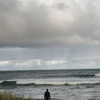 It took me an embarrassingly long time to finally grasp exactly what was so special about Nathan Amundson's work, as it is very easy to lump Rivulets in with '90s slowcore bands like Codeine after a casual listen.  That "casual" part was my mistake, as work like this demands complete attention to reveal its true depth. We're Fucked took five years to fully gestate and it sounds like it, as Amundson painstakingly distilled his songs to their very essence, leaving only naked honesty and restrained, but unflinching intensity.  The best moments are quietly devastating in a way that would be impossible if the songs were any less stark and glacial, as Nathan makes damn sure I don't miss a single word.
It took me an embarrassingly long time to finally grasp exactly what was so special about Nathan Amundson's work, as it is very easy to lump Rivulets in with '90s slowcore bands like Codeine after a casual listen.  That "casual" part was my mistake, as work like this demands complete attention to reveal its true depth. We're Fucked took five years to fully gestate and it sounds like it, as Amundson painstakingly distilled his songs to their very essence, leaving only naked honesty and restrained, but unflinching intensity.  The best moments are quietly devastating in a way that would be impossible if the songs were any less stark and glacial, as Nathan makes damn sure I don't miss a single word.
On a fundamental level, many songs on We're Fucked almost have more in common with haiku than they do with contemporary indie rock music.  For one, Amundson's lyrics are very minimal and poetic in both approach and structure, especially shorter pieces like "Interstate" and "I Am."  That similarity goes much deeper than just lyrics though, as Nathan does not constrain himself to expected songwriting conventions: there is rarely an effort to craft distinct, repeating verses or choruses and songs generally end whenever Nathan is done delivering the lyrics.  Many times that means that a song is over in less than two minutes.  For many artists, that would be a bad move, but Amundson is sufficiently gripping and melodic to make it seem entirely appropriate.  I guess that works because many of these songs would be just as powerful as a capella pieces: the music is good, but it serves more as a backdrop rather than as the focus (at least in most cases).
Nathan's perfectionism and extreme self-awareness serve him well here, as hushed poetic musings such as these could easily fall prey to melodrama or tiresome navel-gazing, but they don't.  There is not a false note to be found anywhere.  While there is an undeniable darkness and sensitivity in these pieces ("I'm a sheep among all you fucking wolves"), Amundson's world-weariness feels very honest, earned, and matter-of-fact. Of course, it also helps that Rivulets can unleash a simmering fury when they put their mind to it, as the trio does in "No Talking."  However, the heaviest song on the album–the previously referenced "Sheep Among Wolves"– doesn't need anything more than Nathan's voice and a lazily strummed acoustic guitar to rip my heart out.
It is a bit surprising that this album chronologically follows 2006's more conventionally musical and filled-out You Are My Home.  We're Fucked actually seems far more like a logical progression from 2003's darker Debridement, which suits me just fine: that was an excellent album.  This one is too, as there are a few songs here that easily rank among the best that Amundson has ever written.  Also, it takes some serious guts to write songs this naked, spare, and minimalistic.
Samples:
 
Read More
- Administrator
- Albums and Singles
TG VINYL RERELEASES
The Second Annual Report vinyl / CD - 31st Oct
D.O.A - Vinyl / CD - 7th Nov
20 Jazz Funk Greats- Vinyl / CD - 14th Nov
Heathen Earth - Vinyl / CD - 21st Nov
TG's Greatest Hits - Vinyl / CD - 28th Nov
Each album will be an edition of 2000 copies.
Chris Carter has remastered the audio and the LP's come packaged with an 8 page full colour booklet featuring some previously unpublished photos, press reviews from the time, and other visual ephemera from the Industrial Records archive.
(Please note that any recent coloured vinyl versions of the same albums are 'bootleg' copies of VASTLY inferior quality. These records were cynically made available to exploit Peter's death, and are NOT authorised by TG or Industrial Records Ltd. Be assured we are actively tracking down the culprits.)
TG DIGITAL DOWNLOADS
These albums have been remastered by Chris Carter and come with their original IR LP artworks and six page PDF booklets.
TG CD RERELEASES
Each title has been remastered by Chris Carter and comes packaged for the first time in the digi-pak format to better represent their original IR LP artwork. Each release in this 'Time Capsule' series, comes with an additional disc of selected TG live performances culled from our TG24 archive recordings. They are selected to represent TG live performances specific to the original release year of each album.
More info here.

Read More
- Administrator
- Albums and Singles

Artist: Loren Connors
Title: Red Mars
Format: CD/Digital
Order info: here
Label: Family Vineyard
Loren Connors has long been heralded as one of the country's most inimitable guitar voices. Like kindred spirit John Fahey, Connors' legacy began by quietly self-releasing a series of raw and embryonic LPs. Since the late 1970s, Connors' use of haunted Delta Blues, minimalism and compositional underpinnings have become an avant-garde style synonymous to him. Along the way, musicians diverse as Chan Marshall, Keiji Haino, Darin Gray, Jim O'Rourke, Jandek, and Alan Licht have sought Connors as a musical partner on record and stage.
Red Mars is the first CD of new solo music by the New York City guitarist since 2004's The Deaparting of a Dream Vol III: Juliet. Since that time, Connors' unmistakable electric blues style presented on album has changed somewhat -- from multilayer tape-recorded pieces to spontaneous live performances. The five pieces here, a suite to the Red Planet, are filled of the cinematic pacing, lyricism and a palette of phantom tones that hoist Connors to a stunning new peak. Portuguese bassist Margarida Garcia joins Connors on the opening journey, introducing a dialogue unique in its ambiance as its entwined mystery and melodies. Features cover artwork by Connors.
Read More
- Administrator
- Albums and Singles
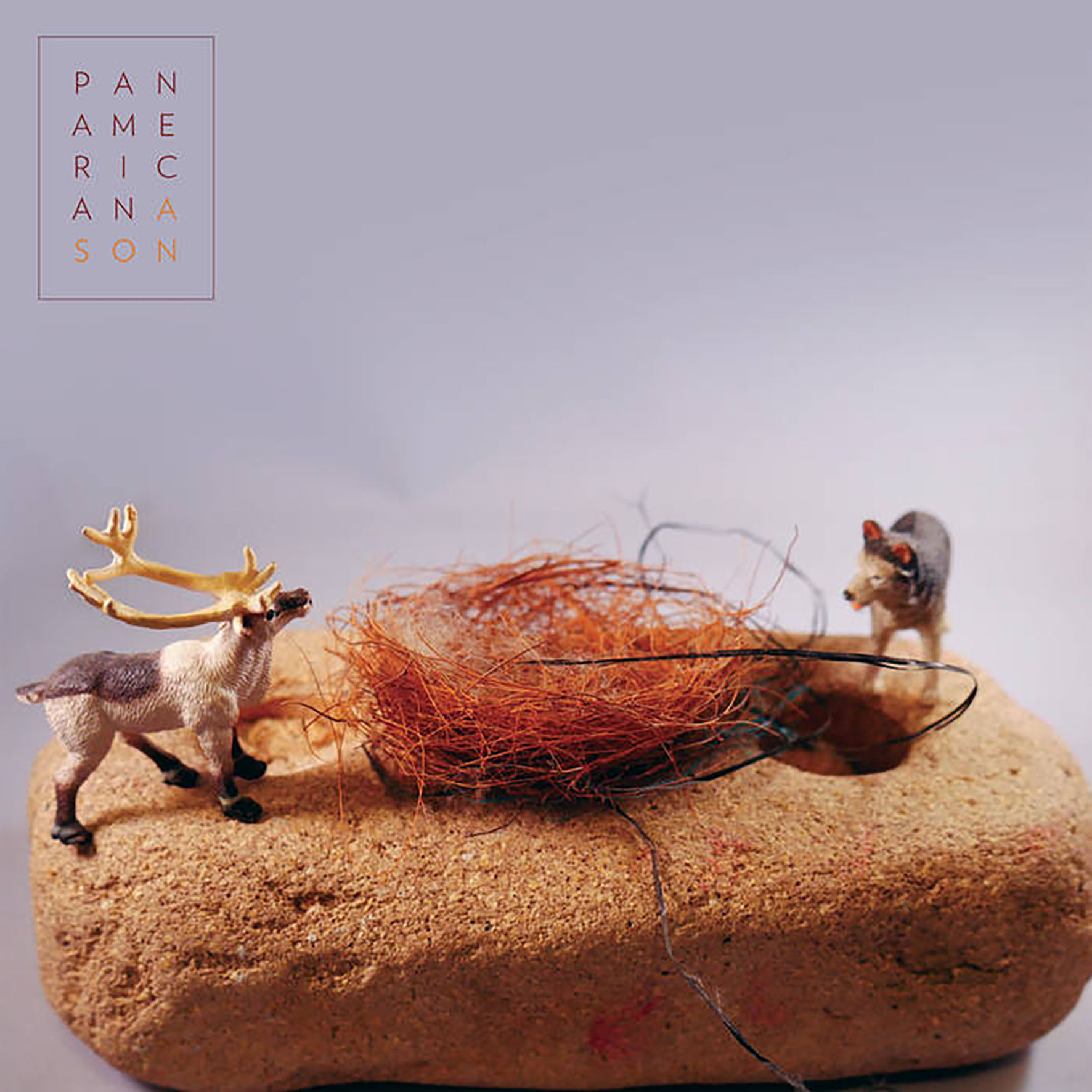 Mark Nelson's Pan•American project has been very quiet over the last several years, as he has been focusing instead on his Anjou collaboration with former Labradford bandmate Robert Donne. With A Son, however, Nelson returns to his solo work in bold and unexpected fashion (by his own quiet and understated standards, at least). In fact, there is very little that stylistically recalls Nelson's post-rock or smoky ambient-dub past at all here, though his aesthetic generally remains a very moody and slow-moving one. At the heart of A Son lies a handful of hushed vocal pieces that capture Nelson's vision at its most stripped-down, direct, and intimate. Those pieces are occasionally quite wonderful, making this release a fitful creative breakthrough of sorts. The rest of the album is not quite as striking, but the blend of songs, sleepily lovely ambient work, and hammered dulcimer pieces add up to pleasantly gentle and dreamlike whole.
Mark Nelson's Pan•American project has been very quiet over the last several years, as he has been focusing instead on his Anjou collaboration with former Labradford bandmate Robert Donne. With A Son, however, Nelson returns to his solo work in bold and unexpected fashion (by his own quiet and understated standards, at least). In fact, there is very little that stylistically recalls Nelson's post-rock or smoky ambient-dub past at all here, though his aesthetic generally remains a very moody and slow-moving one. At the heart of A Son lies a handful of hushed vocal pieces that capture Nelson's vision at its most stripped-down, direct, and intimate. Those pieces are occasionally quite wonderful, making this release a fitful creative breakthrough of sorts. The rest of the album is not quite as striking, but the blend of songs, sleepily lovely ambient work, and hammered dulcimer pieces add up to pleasantly gentle and dreamlike whole.
I am definitely a person who is very prone to remaining in semi-comfortable patterns forever, so I have a deep admiration for Nelson's decision to pare the Pan•American palette down to little more than guitar and voice (especially since the previous formula was quite a winning one).Aside from the conspicuous lack of percussion, electronics, and any nods to a jazz or dub influence, however, A Son is actually not a huge leap from some of the understated, slow-motion reveries that Nelson has recorded in the past.The key difference lies primarily in what Nelson set out to do and how he went about making it happen, as he struggled with questions like "What does music do?","Where does music start?","How simple can it be?"and "How honest can it be?".
Only Nelson himself knows how close he came to actually answering those rhetorical challenges, but he definitely took the simplicity and honesty parts very seriously.In practical terms, that means that the album is much less lush and "produced" than previous Pan•American albums.Instead, the heavy lifting is now shared by languorous guitar melodies and Nelson's quiet, laconic vocals.More importantly, Nelson did not cast away his protective artifice solely in pursuit of greater simplicity, as there is a very real sense that he was straining to make a deeper and more meaningful connection than a flawlessly crafted marriage of lush chords, slow grooves, and heady atmospheres could possibly convey.That said, some strong emotions can be quite ineffable, so the closing elegy for Heather Heyer is a shimmering and winding instrumental built from the traditional song "Shenandoah."It is an absolutely gorgeous piece, but it is not the only one, as some of Nelson's own melodies are every bit as beautiful as those culled from timeless folk songs.
For me, the true heart of the album is the achingly lovely and sublime "Memphis Helena," which initially feels like a classic country song slowed down to a gently hallucinatory crawl.That may very well be intentional, as Nelson has mentioned that The Carter Family were a major influence for this album (as were Jimmy Reed, Suicide, and June Tabor).Though they are unquestionably minimalist heroes, Suicide is the stylistic outlier in that lot, as A Son is a very organic, acoustic, and Americana-inspired affair.Nelson is impressively inventive in how he channels those disparate artists, however, and "Memphis Helena" is an especially great example of his transformative vision.At its core, it is a beautifully crafted and hook-y song with an anthemic-sounding guitar motif, but it is sleepily blurred into a near-hypnagogic state.In lesser hands, that would make the song maddeningly boring and bloodless, but Nelson uses that as the foundation for a slow-burning masterpiece that blossoms into an extremely cool outro of intertwining and harmonizing guitar melodies.
Nelson never quite hits that perfect balance of songcraft and ambient haze again, but he has some success on both sides of that window elsewhere.For example, "Brewthru" comes quite close to being a likably straightforward country/folk song, but it also sounds vaguely ghostly and nocturnal. Elsewhere, Nelson dials down the intensity to such a low simmer on pieces like "Drunk Father" and "Muriel Spark" that their structures dissolve into something almost impressionistic.In both cases, however, the pieces cohere into a lovely crescendo of quiet intensity: "Drunk Father" becomes a languorous swirl of blurred and quavering guitars, while "Muriel Spark" slowly becomes consumed by lingering clouds of distorted chords.A Son shines brightest when Nelson casts a sleepy spell, then sneakily builds towards an elegantly controlled emotional punch.
The remaining pieces could best be described as instrumental interludes that bridge the more substantial songs together, though they do a fine job at sustaining the album's fragile state of slow-moving, soft-focus warmth.A couple of those instrumentals, like the opener and "Kept Quiet," pleasantly highlight Nelson's newfound dulcimer prowess, but the others head in some interesting and divergent directions.I was most surprised by the stark "Sleepwalk Guitars," which calls to mind Dean McPhee at his most meditative and subdued, but the twinkling and gently swaying reverie of "Dark Birds Empty Fields" is the only piece that comes close to rivaling the magic of the vocal pieces.Still, the album flows together quite beautifully and Nelson never allows his lesser ideas to linger around long enough to overstay their welcome.
That amounts to quite a lovely album that feels like contentedly lingering half-asleep under a warm blanket on a crisp fall day. However, that is both a strength and a caveat: A Son is not an album that smacked me in the face with its brilliance immediately, but it became increasingly entrancing once I listened enough to become fully immersed in its nuances and time-stretched languor.Unfortunately, I suspect not everyone will have the patience to get that far, so A Son may be doomed to narrower appeal than its predecessors.For some listeners, however, this more naked and direct incarnation of Pan•American will likely strike a much deeper chord than usual.That makes it good art, but the line between art and entertainment is now a much blurrier one for this project.To me, A Son mostly feels like an admirable and solid transitional album with an occasional flash of brilliance ("Memphis Helena" is an instant classic).While I like the direction this project is headed, Nelson still has a bit further to go before his "man alone in a room with a guitar" side is as unambiguously great as some of the beautifully arranged and meticulously polished work from previous albums.Nelson does not lack for vision, talent, or ambition, but he has chosen quite a challenging path for himself.
Samples can be found here.
Read More
- Administrator
- Albums and Singles
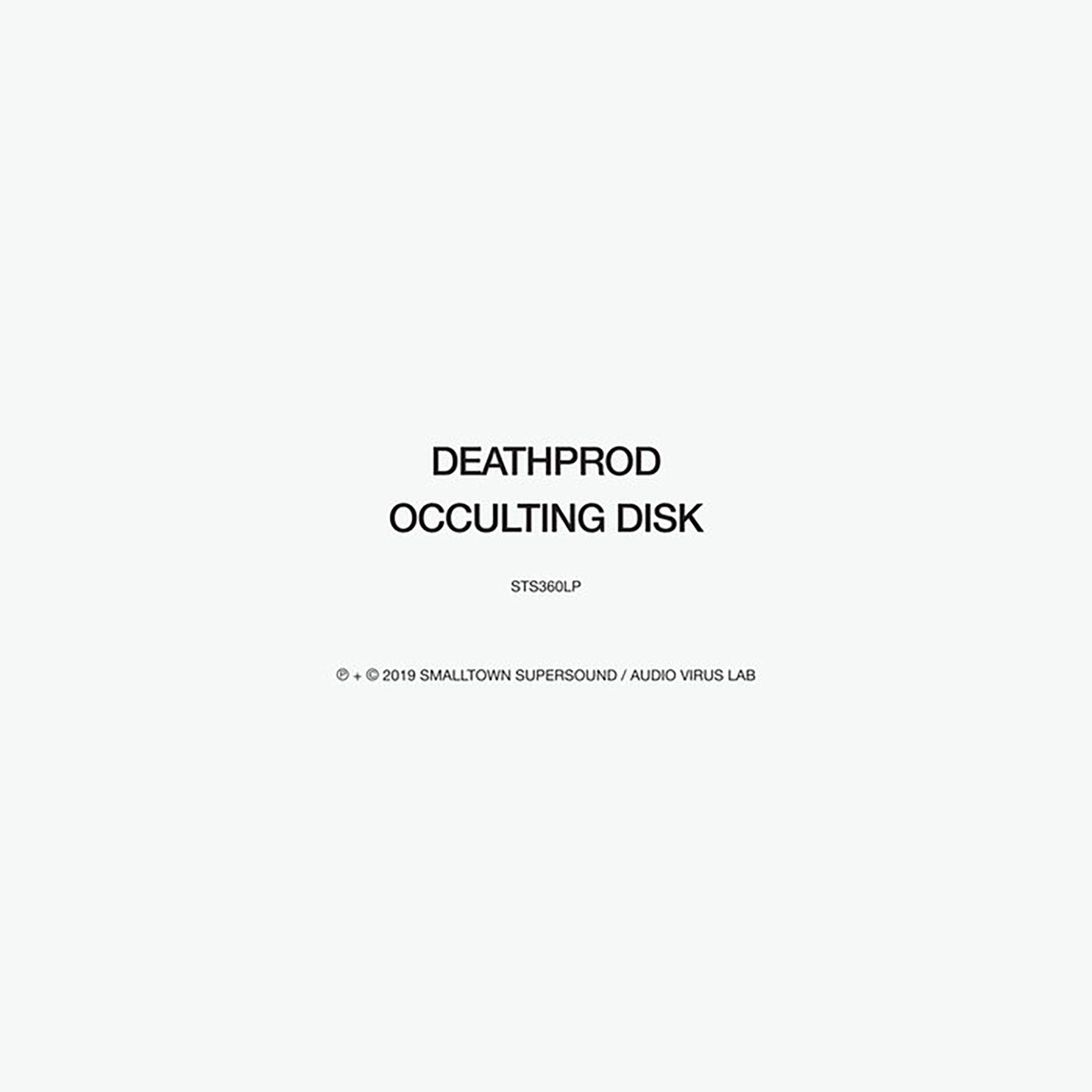 It has been 15 years since Helge Sten's iconic Deathprod project last surfaced with proper new material (aside from a teasing collaboration with Biosphere back in 2015) and he has been missed. Unsurprisingly, that long hiatus did not result in Sten's characteristically grim vision brightening at all. In fact, it has only grown darker, as the bulk of Occulting Disk is bleak void of seismic drones and nerve-jangling insectoid dissonance that Sten describes as an "anti-fascist ritual." I am not particularly optimistic about this album's chances in eradicating fascism any time soon, but the album definitely delivers on the ritualistic part, as this seems like a hell of a great soundtrack for summoning demons. While I am still on the fence about whether I love the stark, crushing blackness of Occulting Disk quite as much as the slightly wider emotional palette of earlier Deathprod, this album is undeniably an impressively visceral and monolithic artistic statement. That is more than enough to reaffirm Sten's status as one of the reigning kings of heavy drone, but the album builds towards an explosive climax that ensures that Occulting Disk feels like an exciting new chapter as well.
It has been 15 years since Helge Sten's iconic Deathprod project last surfaced with proper new material (aside from a teasing collaboration with Biosphere back in 2015) and he has been missed. Unsurprisingly, that long hiatus did not result in Sten's characteristically grim vision brightening at all. In fact, it has only grown darker, as the bulk of Occulting Disk is bleak void of seismic drones and nerve-jangling insectoid dissonance that Sten describes as an "anti-fascist ritual." I am not particularly optimistic about this album's chances in eradicating fascism any time soon, but the album definitely delivers on the ritualistic part, as this seems like a hell of a great soundtrack for summoning demons. While I am still on the fence about whether I love the stark, crushing blackness of Occulting Disk quite as much as the slightly wider emotional palette of earlier Deathprod, this album is undeniably an impressively visceral and monolithic artistic statement. That is more than enough to reaffirm Sten's status as one of the reigning kings of heavy drone, but the album builds towards an explosive climax that ensures that Occulting Disk feels like an exciting new chapter as well.
I have historically not been a big fan of the dark ambient genre, as a lot of uninspired dreck has been released over the years and gloomy drones and rattling chains hold zero appeal for me.That is a real shame, as some of the artists who initially shaped that milieu are on such a completely different plane than their imitators that it seems cruel and unfair that are lumped together in the same stylistic niche.In fact, Deathprod gets bonus points from me for taking such a long vacation from that dour scene, though I am delighted that Sten eventually came back with something new to say.Much like Richard Skelton's The Inward Circles project, Sten's Deathprod work strikes a rare and perfect union of ambitious scope and sound design mastery that can be legitimately awe-inspiring.At its most extreme, Occulting Disk sounds like the universe is being slowly pulled apart as it gets sucked into a vast black hole.The more modest moments, on the other hand, merely sound like the earth is shaking and crumbling as hell opens up.
Most of this album falls into the latter category, though Sten varies the mood a bit by also evoking the anticipatory dread and the scorched aftermath on either side of that infernal apocalypse.On pieces like the opening "Disappearance/Reappearance," however, Sten takes a curiously minimal approach and seems content to just conjure a series of frayed and sizzling synth pulses.That is admittedly something he is quite good at and he gives those deep, shuddering throbs plenty of space to roil and decay.However, the stronger pieces tend to be those where Sten strives to be a bit more than a blackened and gnarled force of nature.For example, "Occultation 1" resembles a slow-motion rain of shooting stars that has been rendered sickly and hallucinatory by the distended warping of time and space.Of those two pieces, that latter definitely achieves the more impressive feat.In those moments of transcendence, Deathprod seems less like a one-man earthquake and more like something supernatural that is blissfully unhindered by the usual limitations of sound and physics.
For the most part, the seven other numbered "Occultations" feel like different heads of the same hydra: each lays out a menacing and dissonant theme and allows it to squirm and smolder for several minutes before it fades away to politely make room for the next horror.Despite their similar forms, however, the eight "Occultations" delve into an impressive variety of uncomfortable, dread-soaked moods.For example, "Occultation 2" is a miasma of grinding, buzzing noise, while "Occultation 3" is a ghostly swirl of swooping and sliding feedback-like tones. I am especially fond of the latter, as I am of the following "Occultation 4," which essentially repeats the same trick in more corporeal form to leave an uneasy wake of ugly oscillations behind its plunging tones.The sixth "Occultation" is quite heavy as well, as thick drones morph and phase-shift in a way that feels like an especially foreboding scene in a noirish, sci-fi dystopia.Following a woozily cosmic interlude of suspended (if comet-streaked) animation, however, the album is finally ripped wide open with the crushing and churning centerpiece "Black Transit of Jupiter's Third Satellite."As soon as it explodes from the speakers in a snarling, heavy, and impossible dense living mass, it is clear that everything beforehand was just a mere prelude to the real show.It feels like I am watching a vast and viscous black cloud blot out and smother the sun in nightmarish slow motion.
The album ends with an eerie coda that feels like quavering, phantasmagoric streaks of light shooting across a completely ruined and desolate landscape, which I suppose is the perfect way for a Deathprod album to end: all life is extinguished in a great cataclysm and an indifferent universe continues on as if nothing had changed at all.It is hard to complain about an album that has such an apocalyptic and world-shaking final act, but it is notable that Occulting Disk feels like a series of vignettes building up to a single dazzling catharsis rather than a collection of fully formed compositions.As such, I can only point to "Black Transit" as a complete and perfect piece.The arc works nicely if the album is viewed as a whole, however, and it can even be viewed as an escalating series of occult rituals designed to open a portal to a malevolent new dimension.Moreover, I love some of the sounds that Sten conjures up in his "Occultations"–it would be a reach to describe this album as dark ambient or really any existing genre at all, as its closest kindred spirit is often the squirming, lysergic lunacy of Rashad Becker’s Traditional Music of Notional Species.As far as my personal sensibility is concerned, that is one of the higher compliments that I can pay an artist.As such, the Deathprod of Occulting Disk is a significantly different animal than the Deathprod of Morals and Dogma or Treetop Drive, but this new incarnation is every bit as great as the old one.
Samples can be found here.
Read More
- Administrator
- Albums and Singles
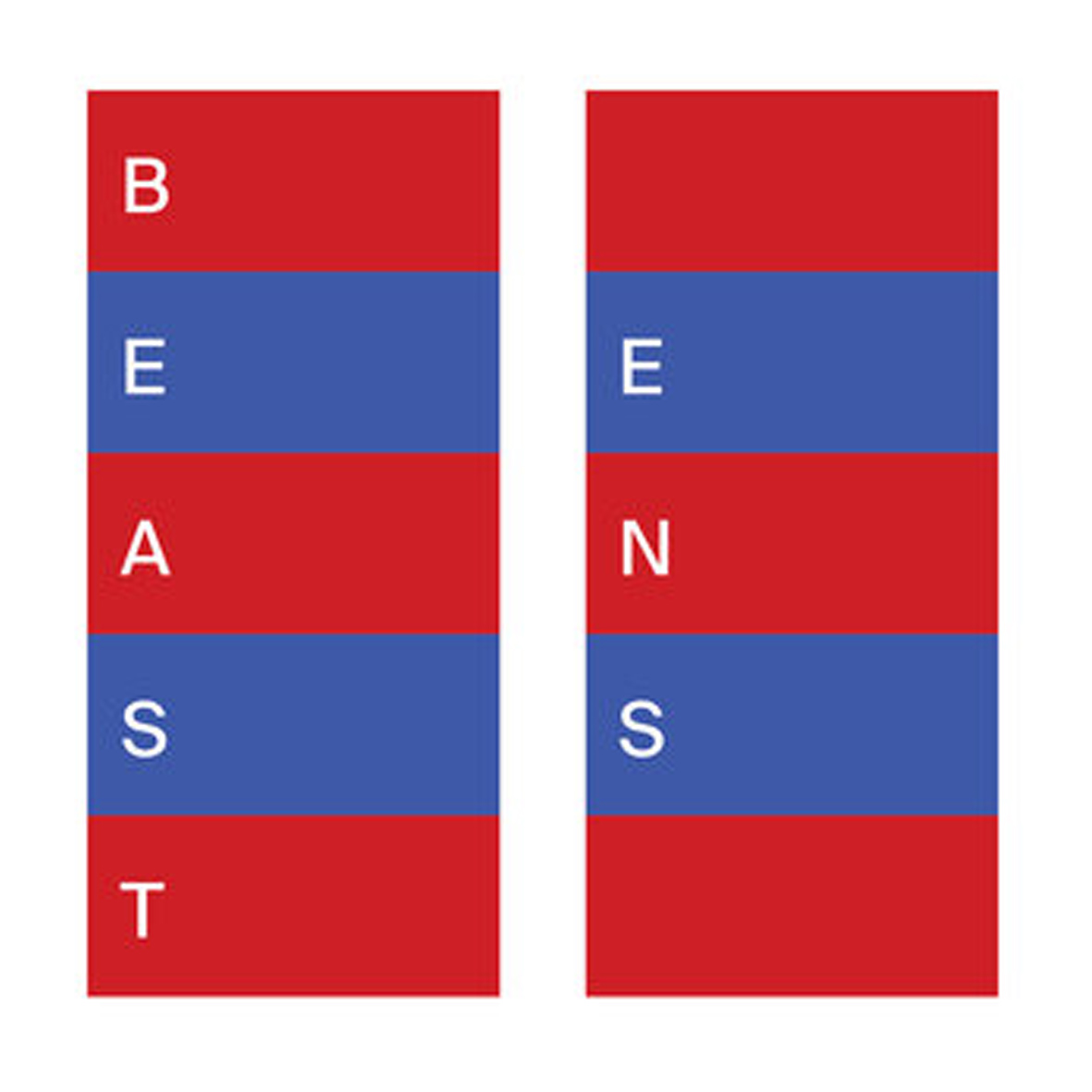
Beast is the latest guise of Mountains' Koen Holtkamp, initially created as a solo project that was performance-based and centered around his experiments with 3D laser projections.  For Beast's Thrill Jockey debut, however, Holtkamp was very much NOT in performance mode, as Ens was recorded around the birth of his first child and is far more shaped by that event and the resultant lack of sleep than it is by his fascination with light. Unsurprisingly, the resulting album is a strange and fragmented one, shifting from tender, pastoral reveries to eruptions of euphoria to dazzling and sublime displays of compositional prowess on a song-by-song basis. While a few pieces are a bit too straightforwardly pretty for my curmudgeonly ears, Holtkamp has long been one of the most intriguing synth composers in the game and that has not changed. His revelatory flashes of inspiration may be intermittent here, but there are definitely impressive when they happen. The opening "Paprika Shorts" is easily one of the best pieces Holtcamp has recorded to date.
Ens (Latin for "being") opens in extremely strong fashion with the aforementioned "Paprika Shorts," which steadily builds from a burbling synth arpeggio into an intricate tapestry of overlapping and intertwining patterns and melodies.Holtkamp has always been quite a brilliant architect at assembling vibrant cascades of colorful and effervescent synth tones and he outdoes himself here, unleashing a shimmering spray of twinkling notes as he slowly locks into an infectiously lurching and evolving groove."Paprika Shorts" is more than just a great hook executed beautifully though, as it seamlessly and unexpectedly transforms into a deeper and darker final act of glimmering minor key arpeggios and gurgling snatches of vocoder-esque speech fragments.Holtkamp achieves a similar degree of success with the other bookend, "For Otto."It is considerably more understated, gentle, and swaying than "Paprika," languorously bubbling, sputtering, and plinking with a warm central melody.Again, however, Holtkamp elegantly steers the piece towards something greater, first adding a shimmering layer of steel drum-like ripples, then allowing the piece to blossom into a coda of warm, rich chords and twinkling streaks of synth tones that feel like a sky full of falling stars.If "Paprika" and "Otto" were representative of the entire album, Ens would be quite an unambiguous triumph.Instead, however, the mid-section of the album explores a number of alternate paths with varying degrees of success.
Of the remaining five pieces, the lengthier ones tend to be the most effective.In the piano-based "Color Feel," for example, Holtkamp augments his slow and simple chord progression with a tumbling and lively torrent of shifting and overlapping patterns that takes a page from the great minimalist composers, yet adapts that aesthetic to fit his own genius for intricate layering.While it admittedly errs a bit too much on the side of radiantly cheery for my taste, it is nonetheless a thing of beauty as far as craftsmanship is concerned. Holtkamp keeps a lot of metaphorical plates spinning and each of them plays an integral role in shaping the arc and cumulative power of the whole.Elsewhere, "Staren" heads in a similarly beatific direction, unfolding as a rolling cascade of marimba-like arpeggios.Holtkamp throws some inventive textural and rhythmic curveballs into the mix though, creating a endearingly off-kilter pulse with pointillist, exhalation-like synths and an erratically stuttering and panning synth throb plopped right in the middle of it all.Again, I am not in love with the tone of the piece, yet Holtkamp departs from the straightforward enough to win me over.The few other pieces on the album feel a bit more insubstantial and incidental though, like they are just pleasantly burbling interludes that merely serve as bridges between the more significant fare.The sole exception is "Edb," which feels like a slow-motion and darkly lysergic companion to "Staren," transforming into a minor key marimba motif that seethes with panning and undulating synth swells.It would be a contender for one of the stronger moments on the album if it had more of an arc, but it is essentially just a brief vamp that presents a cool theme, then fades away rather than evolving.
It is hard to tell how much my opinion of Ens is colored by subjectivity, as my own preferences are a bigger factor than usual when it comes to Holtkamp's work.On the one hand, his work is often informed by a New Age/Kosmische influence that is not my cup of tea at all, and I am deeply weary of the glut of synthesizer albums that have flooded the scene in recent years.Yet despite all that, I still tend to enjoy a lot of his work, so he is clearly doing something very right.With pieces like "Paprika Shorts," Holtkamp transcends his milieu to be a great composer who just happens to use synthesizers.During his less transcendent moments, he merely reaffirms that he is among the top tier of contemporary synth artists, which is not a bad place to be either.Also, while being a great arranger and editor is not exactly sexy or attention-grabbing, those talents are rare to warm my heart when I encounter them.I just wish the actual content of Ens was consistently on the same level as Holtkamp's craftsmanship.Alas.Ultimately, Ens is an enjoyable if uneven album rather than a great one, but I certainly admire Holtkamp's ability to remain a distinctive and compelling voice even while expanding his aesthetic beyond the bounds of my personal taste.More importantly, the few times when the album catches fire are a legitimate delight.More highlights would have been welcome, but I certainly dig the ones that are here.
Read More
- Administrator
- Albums and Singles
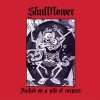 A few months past its sell-by date for Valentine's Day, Skullflower's latest excursion into brutal, uncompromising noise-rock is not to be missed by those who'd rather skip the flowers, dinner and dancing, and get straight to the, uh... consummation.
A few months past its sell-by date for Valentine's Day, Skullflower's latest excursion into brutal, uncompromising noise-rock is not to be missed by those who'd rather skip the flowers, dinner and dancing, and get straight to the, uh... consummation.
Fucked on a Pile of Corpses storms out of the gate with three quick-and-dirty tracks that sound almost too brief by Skullflower standards. Album opener "Hanged Man's Seed" barely has enough time to sink in its teeth, much less outstay its welcome. By length alone, Fucked is the polar opposite of last year's monolithic, double-disc Strange Keys to Untune Gods' Firmament, which didn't boast a single piece under the 7-minute mark. Instead, Matthew Bower opens with a trio of rapid-fire, structured pieces before the album's second half descends into hellish noise, somewhat in the vein of his 2006 effort, Tribulation.
"Hanged Man's Seed" kicks off the album with big bursts of trebly, shattered-glass static, backed by rumbling low-end oscillations. It's a compelling piece, but far too fleeting; this could've been a highlight on its own, had it been stretched out onto side-length vinyl. Instead, it quickly segues into "Viper's Fang," which boasts one of Bower's catchiest riffs under his Skullflower alias: a lo-fi guitar-and-drum motif buried in mounds of reverb and static. Strip away the trebly noise, crank up the subwoofers, add a vocalist of some variety, and "Viper's Fang" might as well be doom metal, or Mogwai-esque instrumental rock, or—you name it.
After a few quick jabs, Fucked on a Pile of Corpses descends track-by-track into Bower's comfort zone: thick mounds of hookless, joyless noise. Perhaps my favorite aspect of Bower's work (as compared to the purely digital racket of today's less creative knob-twiddlers) is the organic feel—derived from human instruments, if not always from human impulses. Accents like the howling, black metal-esque vocals of "Anubis Station," alongside the distinct, guitar-based feedback hovering over the album like a slow-passing thunderstorm, link Skullflower's would-be alien sounds back to humanity.
The most difficult piece is "Tantrik Ass Rape," which lacks the hummable hook of "Viper's Fang," the earthquaking rumble of "Hanged Man's Seed," and the shoegazy smear of "Sleipnir," which closes the album. Instead, "Tantrik Ass Rape" is more akin to Bower's raw, long-form composition on Strange Keys: deep listening for drone connoisseurs, brimming over with physical, unrefined noise.
Samples:
Read More
- Administrator
- Albums and Singles
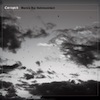 Over their career, Corrupted have been taking a slow (naturally) shift away from their initial starting point: the sludgy assault of the early releases has been replaced with something more akin to modern composition or ambient music. As such, Garten der Unbewusstheit is a logical progression for them as it combines the extreme heaviness of their old recordings with an almost gossamer thin presence. I have always associated their work with the darkness and the atrocities that appear on their album covers and on this album they distil all that hate in one clean swoop into a powerful, positive gesture without losing one shred of their music's emotional effect.
Over their career, Corrupted have been taking a slow (naturally) shift away from their initial starting point: the sludgy assault of the early releases has been replaced with something more akin to modern composition or ambient music. As such, Garten der Unbewusstheit is a logical progression for them as it combines the extreme heaviness of their old recordings with an almost gossamer thin presence. I have always associated their work with the darkness and the atrocities that appear on their album covers and on this album they distil all that hate in one clean swoop into a powerful, positive gesture without losing one shred of their music's emotional effect.
 
The three pieces that make up Garten der Unbewusstheit are less individual pieces than they are movements in what is nearly a symphony. "Garten" builds up from an almost silence as a stark guitar line slowly develops the motif around which the album is centred. The music sounds like Earth’s Hex album if it was re-arranged by Henryk Górecki. There is a sorrow, a melancholy that runs through this piece and indeed the entire album. However, unlike the bleakness of Corrupted’s older works, there is a feeling of hope running through each section. This hopefulness becomes almost a physical entity as the heavy guitars kick in; it feels like the group have scooped me up and delivered me to a god.
Like the aforementioned Earth album, Garten der Unbewusstheit is not just based on an interplay of quiet/loud dynamics. Corrupted use timing in a way that secures the listener in front of the speakers like a set of manacles. Notes are left to hang for what feels like an eternity before the next wave of sound knocks the disturbed air back down. Relying on timing and expression, the music is forceful even when the group’s focus is upon the delicate sound of a classical guitar as evidenced on the instrumental "Against the Dark Days," which bridges the two major pieces of the album.
The performance of a group as a whole is never less than intense and impressively, as epic and evocative as the music gets, Hevi’s vocals manage to chart the same depths and channel the same power as the other elements of the work. Sadly this was his last recording with the group before he left music earlier this year to dedicate his life to cosplay. Whether Corrupted do as well with his replacement, Taiki, remains to be seen but as a swansong for Hevi, it would be hard to beat this.
On the album’s closer, "Gekkou no Daichi," the band come together for one last, long push towards infinity. Slowly, they return to the same clusters of notes that opened the album before igniting the fuse and lifting off into the stratosphere. At its peak, the piece explodes into a cathartic, uplifting and decimating inferno. While I know a lot of people seem to prefer the old Corrupted to their current (or at least most recent) incarnation, I do not know how based on the sheer vastness and passion of pieces and indeed albums like this. The final minutes take all the pessimism, dejection and moral extremity that they have explored in their career and convert it all into one final hopeful thrust for a blissful enlightenment; a state of nirvana or satori.
I have listened to Garten der Unbewusstheit at least a dozen times in the last few weeks and it seems to only increase in its influence. This is an astounding album beyond any simple notion of "Is it good?" or "Is it heavy?" No, it is an emotionally cleansing experience.
samples:
 
Read More
 Christian Fennesz's latest release is a succinct, beautiful burst of vibrant music. The way Fennesz walks the line between experimental electronics and pop without really falling into either category has always intrigued me and he rarely disappoints. This EP is no exception as the colours and feelings of classic Fennesz albums like Endless Summer and Venice are evoked yet this sounds little like either album.
Christian Fennesz's latest release is a succinct, beautiful burst of vibrant music. The way Fennesz walks the line between experimental electronics and pop without really falling into either category has always intrigued me and he rarely disappoints. This EP is no exception as the colours and feelings of classic Fennesz albums like Endless Summer and Venice are evoked yet this sounds little like either album.
- Administrator
- Albums and Singles
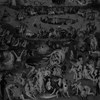
Xela and I got off to an unfairly bad start, as I was first exposed to John Twells through his anomalous black metal opus (The Illuminated) in 2008 and decided that his work just wasn't for me.  Curiously, that very album began the trilogy that this album finishes, but the only real trait that the two albums share is a devotion to all things bleak, murky, and ominous, this time manifested in beautifully forlorn, slow-motion drone.  That evolution is a welcome one.  In fact, the first half of this album is easily one of the best pieces that I have heard all year.
Having already ambitiously tackled nautical horror with 2006's The Dead Sea, it was only natural that Twells would eventually decide to tackle horror on a much deeper and metaphysical level.  He certainly did not shy away from the challenge, as this trilogy is very Milton/Dante-esque in both content and scope, with the emphasis placed quite squarely on the infernal side of life (and the afterlife).
As befits a fascination with the fall of man and the torments of hell, Twells' recent sound has been a rather scorched, gnarled, and corroded one, which is both a blessing and curse.  That hissing murkiness is very effective at conveying an atmosphere of  vague dread and hinted-at nightmarishness, but it also has a tendency to obscure the content or even to become the focus itself.  It is hard to keep a 20-minute piece compelling on atmosphere alone, but John has recently become very adept at combining his textural genius with similarly inspired composition and melody.  The Sublime begins exactly where The Divine's stunning "Of The Light And Of The Stars" left off, burying heavenly drones and swells beneath a patina of rot and decay in the opening "Lust & Paradise."  The effect is both achingly beautiful and crushingly sad.
"Lust & Paradise" is definitely the stronger of the two pieces, due to its steady throb, spectral melody, and slow-burning accumulation of power.  The closing "Eve's Riposte" has some inspired moments too though, especially the simple melancholy melody lurking beneath all the mist and rumble.  It would actually be the perfect languid come-down for the entire trilogy if it wasn't for for a monotonous and increasingly invasive major chord swell that consumes most of its second half.  I was initially horrified that Twells' was ending such an audaciously ugly and dark-hearted undertaking on an uplifting note, but some discordant grinding and buzzing mercifully arrived at the very end to plunge everything into discordance and hopelessness once more.  That late album derailment aside, this remains a remarkable effort: few albums can boast an entire side of absolute perfection like "Lust & Paradise."
(Note: The Sublime was originally issued on cassette by Digitalis in 2010 with extremely cool cover art, but that version is long unavailable)
Samples:
 
 
Read More
- Administrator
- Albums and Singles
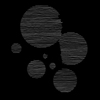 This is the second installment of Nate Wooley's wonderfully uncategorizable improvisation project based upon a fixed backdrop of abstract tape recordings.  Notably, it sounds radically different than the skittering and nightmarish first album (where Wooley was joined by Paul Lytton and David Grubbs) and continues to betray no hint of Wooley's background as a jazz trumpeter.  This is improvised music at its most difficult and listener-unfriendly, alternating between queasily dissonant droning and explosive catharsis.  I like it, but it is very much pure, uncompromising art without any nod to accessibility.
This is the second installment of Nate Wooley's wonderfully uncategorizable improvisation project based upon a fixed backdrop of abstract tape recordings.  Notably, it sounds radically different than the skittering and nightmarish first album (where Wooley was joined by Paul Lytton and David Grubbs) and continues to betray no hint of Wooley's background as a jazz trumpeter.  This is improvised music at its most difficult and listener-unfriendly, alternating between queasily dissonant droning and explosive catharsis.  I like it, but it is very much pure, uncompromising art without any nod to accessibility.
This performance, recorded in 2009, is a confounding and expectation-subverting one in many ways.  Even its very title initially puzzled me, as it unambiguously references Thomas Merton's autobiographical account of his spiritual journey towards becoming a Trappist monk.  There is nothing about this piece (or its predecessor) that says "quest for inner peace" or "religious ecstasy"– quite the contrary, in fact.  Instead, the mood is rather seething, haunted, and disturbed, as Wooley's true inspiration is a bit less obvious: the honesty, fear, and struggle of Merton's actual life.  In retrospect, that seems appropriate, as Nate avoids obviousness in every possible respect here (to an almost pathological degree).
The most significant idiosyncrasies come from Wooley's compositional structure and trumpet playing.  For one, Wooley doesn't just play the trumpet in an unusual way here, he plays it in an entirely unrecognizable way.  He manages, as near as I can tell, to avoid playing a single note in the traditional sense for the piece's entire 42-minute duration.  Instead, he uses contact mics to amplify his breathing and valve manipulation and to create feedback.  Also, the piece's backbone–the tapes–seem to be cut from the same cloth, which seems like a very bizarre and minimal structure to repeatedly base a lengthy performance upon (lots of hissing, scrape-like sounds, and understated hums).  It is nearly impossible to tell what is live and what is prerecorded.  It works, mind you, but it is difficult for me to understand the mental process behind it, though I certainly admire its daring.
Given that he is the only one playing a conventionally melodic instrument, C. Spencer Yeh's violin seems to drive the piece by default.  At first, he restrains himself to long droning notes that harmonize uncomfortably with Wooley's drifting feedback, but the piece gradually escalates into something resembling a marauding flock of inebriated seagulls backed by Chris Corsano's somewhat muted drum flurries. The piece seems to truly catch fire around the halfway mark, as Yeh's seagull attack is gradually bolstered by layers of low tormented moans, vicious bow scrapes, shrill air raid siren swoops,  feedback squalls, and an increasingly frenzied and cymbal-heavy Corsano.  There is no one better to have around for roiling, clattering cacophony than Chris Corsano.
Gradually, all the chaos subsides and the piece ends with drifting, uncomfortably harmonized drones and lazily repeating feedback buzz and hiss (but not before one spectacular and unexpected blast of stuttering, spacey sounding feedback and cavernous breathing noises).  It makes a fine denouement to the prolonged and visceral white-hot climax that preceded it.  Of course, the piece is not without some notable flaws (the first half drags a bit, it is markedly less compelling without headphones and focused listening, etc.), but they are very easy to forget once the trio hits their full momentum.  This definitely required a lot of patience, attention, and tolerance for dissonant harmony to fully grasp and appreciate (more than the 2009 version, I think), but it was ultimately well-worth it.  Wooley has birthed something unique and impressive.
Samples:
 
Read More


